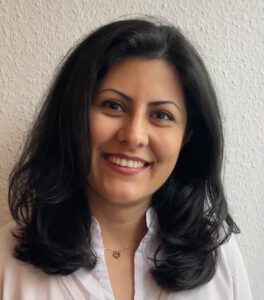Session Leaders
 Azadeh Akbari is a postdoctoral research associate and academic staff at the Institute for Geography at the University of Münster. Her research focuses on surveillance in the Global South, feminist geographies, and digitisation of immigration. She has received her PhD in human geography from Heidelberg University and her MSc degree in gender research from the London School of Economics and Political Sciences. She also has been a journalist, feminist activist, and a communication specialist employed by different UN agencies and international organisations. Azadeh is the founder of Surveillance in the Global South Research Network.
Azadeh Akbari is a postdoctoral research associate and academic staff at the Institute for Geography at the University of Münster. Her research focuses on surveillance in the Global South, feminist geographies, and digitisation of immigration. She has received her PhD in human geography from Heidelberg University and her MSc degree in gender research from the London School of Economics and Political Sciences. She also has been a journalist, feminist activist, and a communication specialist employed by different UN agencies and international organisations. Azadeh is the founder of Surveillance in the Global South Research Network.

Chenai Chair is the Special Advisor on Africa Mradi Innovation at Mozilla Foundation and an expert on the intersection of digital technology and gender. She has developed projects focused on privacy, data protection and AI as Mozilla 2019/2020 fellow (available on mydatarights.africa). She also led the research on Women’s Rights Online as the Web Foundation’s gender and digital rights research manager. She also works as a consultant on research projects focused on digital rights including assessing the state of digital identity in Zimbabwe and developed recommendations for digital rights literacy in Southern Africa. She is currently an Internet Governance Forum Multistakeholder Advisory Group Member and a steering committee member for The Center for International Governance Innovation’s work on assessing online Gender Based Violence. Chenai holds a Masters in Social Science degree focused on Global Studies from the University of Cape Town.
 Shyam Krishna focuses on researching algorithms, data and labour practices within digital identity programs, in the gig-economy and in their overlap seen in Indian contexts. He is a late stage Doctoral candidate at the School of Business and Management, Royal Holloway, University of London and is part of the Digital Organisation and Society (DOS) Research Centre. He tweets at @digiflaneur.
Shyam Krishna focuses on researching algorithms, data and labour practices within digital identity programs, in the gig-economy and in their overlap seen in Indian contexts. He is a late stage Doctoral candidate at the School of Business and Management, Royal Holloway, University of London and is part of the Digital Organisation and Society (DOS) Research Centre. He tweets at @digiflaneur.
 Midori Ogasawara is an assistant professor in the Department of Sociology at the University of Victoria, British Columbia, Canada. Her PhD dissertation explored the Japanese identification systems as surveillance, population control and colonial Violence in occupied Northeast China. Midori’s postdoctoral research at the University of Ottawa investigates how security intelligence agencies have been negotiating the legal boundaries to legalize previously illegal mass surveillance activities. Midori was an investigative journalist for Japan’s national newspaper The Asahi Shimbun. In 2016, she became the first Japanese journalist/researcher who interviewed the US National Security Agency whistleblower Edward Snowden via a video channel, and published two books (2016, 2019) that reveal the NSA’s secret activities in Japan and Japan’s hidden role in providing a global hub for the US intelligence agencies.
Midori Ogasawara is an assistant professor in the Department of Sociology at the University of Victoria, British Columbia, Canada. Her PhD dissertation explored the Japanese identification systems as surveillance, population control and colonial Violence in occupied Northeast China. Midori’s postdoctoral research at the University of Ottawa investigates how security intelligence agencies have been negotiating the legal boundaries to legalize previously illegal mass surveillance activities. Midori was an investigative journalist for Japan’s national newspaper The Asahi Shimbun. In 2016, she became the first Japanese journalist/researcher who interviewed the US National Security Agency whistleblower Edward Snowden via a video channel, and published two books (2016, 2019) that reveal the NSA’s secret activities in Japan and Japan’s hidden role in providing a global hub for the US intelligence agencies.
Özgün Topak is an Assistant Professor in the Department of Social Science and a resident scholar at the Centre for Refugee Studies (CRS) at York University. Özgün is an interdisciplinary social scientist whose research areas include surveillance studies, migration and border studies, and critical social theory. His recent and current projects include authoritarianism and surveillance in Turkey and the Middle East, biopolitical violence at the border camps of the EU, and surveillance of Syrian refugees during Canadian vetting. His recent work appears in a number of interdisciplinary journals, including Antipode, Security Dialogue, Geopolitics and Surveillance & Society.
 Keren Weitzberg is a researcher, writer, and ethnographic consultant with extensive, on-the-ground expertise in East Africa. Working at the intersection of science and technology studies (STS) and migration studies, she examines problematics related to mobility, digital identity, and biometrics. She has over a decade of experience carrying out archival research, fieldwork, and interviews in multicultural, multilingual settings and collaborating with non-profit groups, artists, and practitioners across the US, UK, continental Europe, the Middle East, and Africa. Keren is the writer of “We Do not Have Borders”, which examines Somali transnational networks in Kenya.
Keren Weitzberg is a researcher, writer, and ethnographic consultant with extensive, on-the-ground expertise in East Africa. Working at the intersection of science and technology studies (STS) and migration studies, she examines problematics related to mobility, digital identity, and biometrics. She has over a decade of experience carrying out archival research, fieldwork, and interviews in multicultural, multilingual settings and collaborating with non-profit groups, artists, and practitioners across the US, UK, continental Europe, the Middle East, and Africa. Keren is the writer of “We Do not Have Borders”, which examines Somali transnational networks in Kenya.